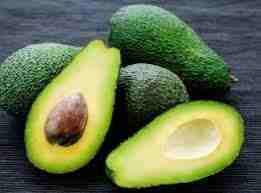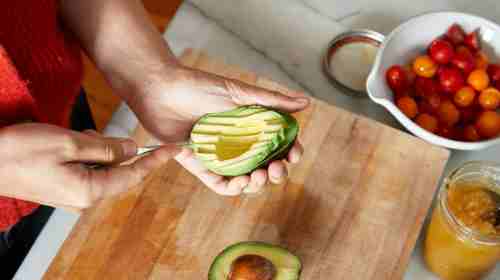Avocado is a fatty fruit of the avocado tree, mentioned scientifically by the scientific name of the American Persea. It is a nutritious food that can be a great source of several minerals, vitamins and plant components.
The avocado is native to Mexico in Central America and has a silky and creamy texture. It is rich in monounsaturated and significantly greater fats than in other fruits.
Avocados have a unique nutritional profile. They’re a good source of fibre and are high in minerals and vitamins, including B vitamins and potassium, vitamin K, copper, vitamin E, and vitamin C.
The research found that eating avocados has several health benefits, including a lower probability of cardiovascular disease. Avocados are also extremely satisfying and can be useful for losing weight.
Numerous avocado varieties vary in size, colour and shape. Eating fresh avocados in milkshakes or as sauces such as guacamole is possible.
They usually have a pear shape, but they can also be round and come in many tones that range from light green to black or almost when they are completely mature.
The most well-known type is known as the Hass avocado. This fruit is a round shape with black skin.
Avocado Nutrition Facts
A half-cup of avocado (100g) contains 163 calories and 2g protein, 8.5g of carbs, and 14.7g of fat. Avocados are a great source of magnesium and potassium, as well as Vitamin C, E, and vitamin K. This nutrition information refers to half an avocado. USDA supplies it. USDA.2

Calories: 160
Fat: 14.7g
Sodium: 7mg
Carbohydrates: 8.5g
Fibre: 6.7g
Sugars: 0.7g
Protein: 2g
Magnesium: 29mg
Potassium: 485mg
Vitamin C: 10mg
Vitamin E: 2.1mg
Vitamin K: 21mcg
Carbs
A majority of the carbs within an avocado are fibre. The whole avocado has 17 grams of carbohydrates and 13.4 grams of fibre.2 It is relatively low in sugar found in avocados (less than 1 Gram), and most of the carbohydrate found in the fruit is derived from starch.
The glycemic index of avocado is thought to be close to zero. This makes avocado the lowest-glycemic food.3
Fats
The whole avocado is a good source of 30 grams of fat. This includes 4.2 grams of saturated fats, around 20 grams of monounsaturated fat, and 3.6 grams of polyunsaturated fat. Thus, even though most of the calories in the avocado are from fats, they’re most often in the form of more healthy monounsaturated fat.
Monounsaturated Fatty Acids or MUFAs are derived from plants, which can aid in the reduction of LDL as well as “bad” cholesterol. This is why The Academy of Nutrition and Dietetics advises choosing food items with monounsaturated fats rather than saturated fat.
Protein
Half an avocado contains approximately two pounds of protein. Even though it’s not an extremely protein-rich food item, it’s a good option to assist you in meeting your amount of protein.
Vitamins and Minerals
When you only eat a few slices of avocado, they will provide little minerals or vitamins because the portion size is tiny. A whole avocado, however, can be a great source of vitamins K, C and E.
Avocado is also rich in folate, riboflavin, niacin, and pantothenic acid. The minerals in avocado are copper, magnesium, potassium, manganese, and copper.
What is the recommended amount of avocados to consume?
Avocados are a great source of nutrition. When used as a part of a plant-based, healthy, all-natural diet, they should not be the only source of healthy fats. If you want to lose pounds, try to consume no more than an avocado daily. Aiming for one avocado per day allows you to add additional sources of healthy fats within your daily diet, including olive seeds, olive oil and even nuts. Including diverse nutritious fats in your diet is crucial for the best benefit.
The benefits of avocados

Avocados have a reason they are touted as a healthy food. A few of the benefits from avocado are:
Healthful fats
While they’re higher in fat than carbohydrates, they’re the kind that is heart-healthy and doesn’t cause an increase in cholesterol levels. The high amount of fat in avocados is a great choice in vegetarian or vegan diets. Also, they’re popular among people counting their carbs, like those suffering from diabetes.
Additionally, they fill you up and help reduce your cholesterol levels. Avocados are also rich in healthy fats. Avocados benefit the skin, brain joints, digestion, and skin.
Fibre
A single avocado contains about 10 grams of fibre. That’s an important portion of the 25 grams of fibre you must consume daily. Fibre will be your best friend if you’re looking to shed pounds. It will keep you fuller longer. It can also assist in lowering your cholesterol levels and blood sugar and fight certain cancers.
Antioxidants
Avocados are rich in fat-soluble carotenoids known as Zeaxanthin and lutein. The plant compounds in the fruit naturally exist in the eyes of your. They shield your eyes from harm caused by ultraviolet sunlight. A diet rich in Zeaxanthin and lutein is linked to a lower risk of developing cataracts and macular degeneration.
Prebiotics
Consuming avocados can lead to better gut microbiomes. The prebiotics found in avocados are the source of food that good bacteria require to consume to create probiotics. Recent research on individuals who consume avocados daily found that they ate less fat through their diets. This could aid in weight loss.
Store and buy avocados
If you’re looking for avocados, choose an avocado with a dark green close to black skin that bends to pressure from a small amount when squeezed. Avocados with lighter green skins that are hard to chew have yet to reach ripeness. They are still available for purchase, but you must be patient until they’re ripe before consuming them. Avocados are still ripening once they’ve been picked. But it’s best to avoid purchasing avocados that have cracked skin or soft spots. They are not ripe enough and will not be safe to eat.
When you have brought your avocados home and are ready to use them, it is best to immediately utilize those that are ripe or keep them in a refrigerator. An unripe and hard avocado can ripen at room temperature for 2 to three days. If you’d like to expedite the process, it is possible to place the avocado inside a bag made of paper together with the help of a banana. Bananas release ethylene gas, which can speed up the process of ripening.
Preparing avocados
Avocados are endlessly versatile. They are flavourless, which is ideal for desserts and meals. The preparation process is straightforward to incorporate into various meals.
Peeling and pitting avocados
To remove and pit your avocado, you must do these steps:
- Cleanse your avocado thoroughly.
- Slice it along the length of the pit.
- The avocados should be rotated and then break them up.
- The tip of a spoon under the pit, then gently lift it.
- Scoop the avocado flesh by using a utensil.
- Add lime, lemon, or vinegar to stop it from turning brown.
- Place your avocados in an airtight jar in the refrigerator. If the avocado turns brown, you can consume it. However, you should take off the brown scum before eating it. Place plastic wrap on the avocado’s surface before refrigerating it to store leftovers and prevent their browning.
Summary
Avocados are extremely filling, extremely nutritious and taste delicious.
They’re an excellent source of minerals, vitamins, and plant-based compounds. It can be beneficial to joints and heart health.
Avocados are an excellent addition to a healthful diet.